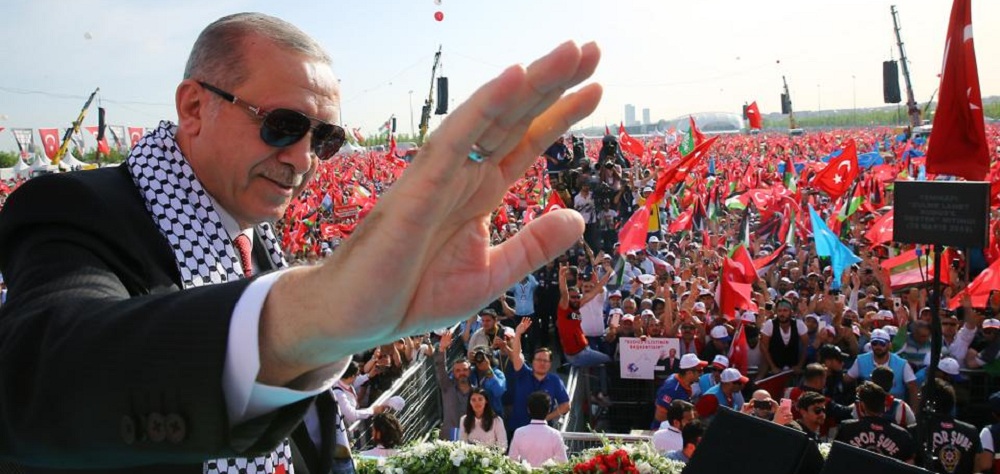Having in mind that due to presence of the fascist hardliners in the Israeli cabinet, the security conditions in the occupied territories, particularly in al-Quds (Jerusalem) and the holy al-Aqsa Mosque, are severely tense and the Muslim public opinion are calling for a serious response to the atrocities of Israeli occupation, a reaction to the ongoing developments in the occupied territories can make a wining card for political figures seeking to hold their power.
Turkish President Recep Tayyip Erdogan, who is bracing for decisive presidential elections of May 14, is also using the internal developments in Palestine to secure a victory. In recent days, in line with Muslim countries, Erdogan said that the holy Al-Aqsa Mosque was a “red line” for this country and that Ankara cannot remain silent in the face of Israeli hostilities.
“I condemn the vile acts against the first qiblah of Muslims in the name of my country and people, and I call for the attacks to be halted as soon as possible,” Erdogan said in a speech at a fast-breaking dinner, adding: “The name of this is the politics of repression, the politics of blood, the politics of provocation. Turkey can never remain silent and unmoved in the face of these attacks.”
He also stressed the need for the Muslim world to unite its ranks to counter the Israeli crimes against the Palestinians in a phone conversation with his Iranian counterpart Sayyed Ibrahim Raisi.
In addition to Erdogan, the Turkish Foreign Minister Mevlüt Cavusoglu condemned the Israeli attacks on Al-Aqsa Mosque and called for an end to them.
The way of reactions by Ankara officials to Al-Aqsa Mosque developments indicate that Palestinian cause is of high significance to the Turkish public. Therefore, by taking fiery stances against Israeli government, the Erdogan tries to tell his people that he is still a patron to the Palestinian people and normalization with Tel Aviv does not disturb Ankara’s positions regarding Palestine.
Turkey people doubtful about erratic Erdogan stances
Despite Erdogan’s supportive stances to the Palestinians, people of Turkey are not certain about his real intentions given his contradictory positions over the past two decades, especially on the eve of elections. In 2009, on the sidelines of the Davos summit, Erdogan severely criticized Shimon Peres, then Israeli president, for Tel Aviv crimes in the Gaza Strip, and left the meeting in protest. At that time, Erdogan’s popularity among the region’s public surged, and one of the driving forces behind his repeated victories in the elections is his supports to the oppressed Palestinian people.
During his political life, Erdogan has proven that he is inclined to compromise with the enemies and sit with them at the same table if his personal interests demand. Driven by this approach, in the past two years, he scaled down his support to the Palestinians and instead extended a hand of friendship to the Israelis in order to win the occupation’s support. Last year, after 12 years of tension with the Israeli regime, the Turkish government resumed its political relations with this Tel Aviv and the embassies of both sides were reopened. The Turkish leader made some concessions to the Israelis to win their satisfaction.
Last year, Turkey suspended Hamas activities on its soil, meeting one of the conditions of the Israeli regime for a détente. Over the past years, Ankara, the biggest supporter of the Muslim Brotherhood, of which Hamas is a branch, granted a special office to Hamas and engaged in massive cooperation with the Palestinian resistance movement, but one of Tel Aviv’s conditions was shutting down the office and expelling the leaders of this movement from Turkey. Although Erdogan and other Turkish officials claimed that the normalization does not derail the country’s support for Palestine, the Palestinian conflict is such that friendship with either side means turning your back on the other side. So, Ankara’s normalization policy was a kind of distancing from Palestinian liberation ideals.
Even in the summer of last year, when the tensions between Iran and the Israeli regime ran high and Tel Aviv officials claimed that Tehran was planning assassination of Israeli citizens on Turkish soil, the Turkish government arrested 8 people on the charge of preparing an attack against Israeli citizens. Additionally, the Turkish government arrested a spying network affiliated with the Mossad which included dozens of people, but Erdogan turned a blind eye to such an important issue that targeted the national security of his country to avoid a crisis hitting fledgling ties with Israel. Turkey, which has been facing an economic crisis for the past three years, had counted on Israeli financial support to curtail its effects in the society, and to attract this support, it had to breach some of its declared positions.
Despite all these Ankara services to the Israelis, people of Turkey still detest the Israeli regime. That is why in June last year, they held rallies opposing any normalization with Tel Aviv. Unlike their leaders that sacrifice the Palestinian cause for their political and personal interests, the people of Turkey advocate the Palestinian groups and Erdogan is aware of this reality and that is why he is these days claiming support to the West Bank to persuade people to trust him again for presidency.
Erdogan, who is a month away from the election has fallen behind his
main rival according to polls and is seeing his power on shaky
foundations, is trying to attract the religious and Islamic voters and
raise his victory chances by restoring ties to Syria and intensively
supporting the Palestinian people.
/129

